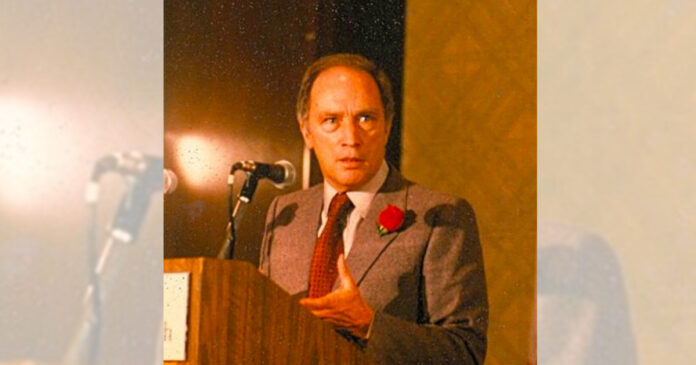Former prime minister Pierre Elliott Trudeau argued against revoking the citizenship of a man accused of Nazi war crimes, according to a decades-old government report.
The Commission of Inquiry on War Criminals was re-released Thursday under an Access to Information request from Jewish advocacy group B’nai Brith, with many portions now unredacted.
It was written in the 1980s by historian Alti Rodal and prepared for the Deschêsnes Commission, an investigation launched into Nazis who fled to Canada after the Second World War.
It was first released to the public in 1987 but much of it, including Pierre Trudeau’s position, was heavily redacted.
While serving as justice minister in 1967, Trudeau argued against deporting a Canadian citizen identified as Subject F, who was tried in absentia and found guilty in a court in Riga, Latvia in 1965.
Subject F had been convicted by the Soviet Union of heading a firing squad in the Second World War that was responsible for the murder of 5,128 Jews.
The Department of External Affairs, now called Global Affairs Canada, sought Trudeau’s legal opinion on whether or not the Soviet Union had a solid case for extradition. As justice minister under Prime Minister Lester Pearson, Trudeau responded by saying “it could not be established that Subject F knowingly concealed material circumstances relating to his good character even if it be assumed that he was, in fact, guilty of the crimes for which he was convicted in absentia.”
Trudeau was worried that the deportation of Subject F could set a dangerous precedent that would see other Canadians stripped of their citizenship.
He further elaborated on his stance in a letter to Paul Martin Sr., who was secretary of state for External Affairs at the time.
“There is nothing in the Act to indicate that an application for Canadian citizenship is in the nature of a confessional requiring the applicant to disclose all prior conduct, whether public or private,” wrote Trudeau.
“If we did so, I think we would be forced to concede that similar steps might be taken against any person who had obtained a certificate of citizenship if it were found that he had not disclosed occurrences in his past which we, the government now decide to be of sufficient gravity as to constitute concealment of circumstances material to his grant of citizenship,” he continued.
“I cannot therefore, on the basis of my present appreciation of this case, recommend or concur in a course of action designed to strip subject F of his Canadian citizenship.”
Trudeau’s decision was met with pushback from the Canadian Jewish Congress, who continued to pursue Subject F’s deportation, according to Rodal’s report.
“It’s hardly surprising that, as the minister of justice, (Trudeau) wasn’t just thinking legally, he was thinking politically,” David Matas, senior legal counsel for B’nai Brith, told CBC News.
“The bringing of mass murderers to justice should not be sidetracked by political considerations.”
There has been a revival of Jewish organizations in Canada demanding the Canadian government unseal all documents related to Nazis residing in Canada in the aftermath of former Ukrainian Nazi Yaroslav Hunka receiving a standing ovation from MPs in Parliament during a visit from Ukrainian President Volodymyr Zelenskyy.
Immigration Minister Marc Miller supported the release of a less redacted Rodal Report, while acknowledging that certain information will remain protected under the Information and Privacy Act.
“Those who suffered under Nazi Germany and their descendants want transparency when it comes to this shameful chapter in our history,” said Miller in a written statement. “More can and should be done to provide transparency.”
Matas agrees that there is still much more work to be done in regards to government transparency.
“What we want is a complete release of the records,” said Matas.
“Once the survivors (of the Holocaust) have passed away, what we’re left with in terms of Holocaust remembrance is the records. And so the records become of increasing importance as times go.”















